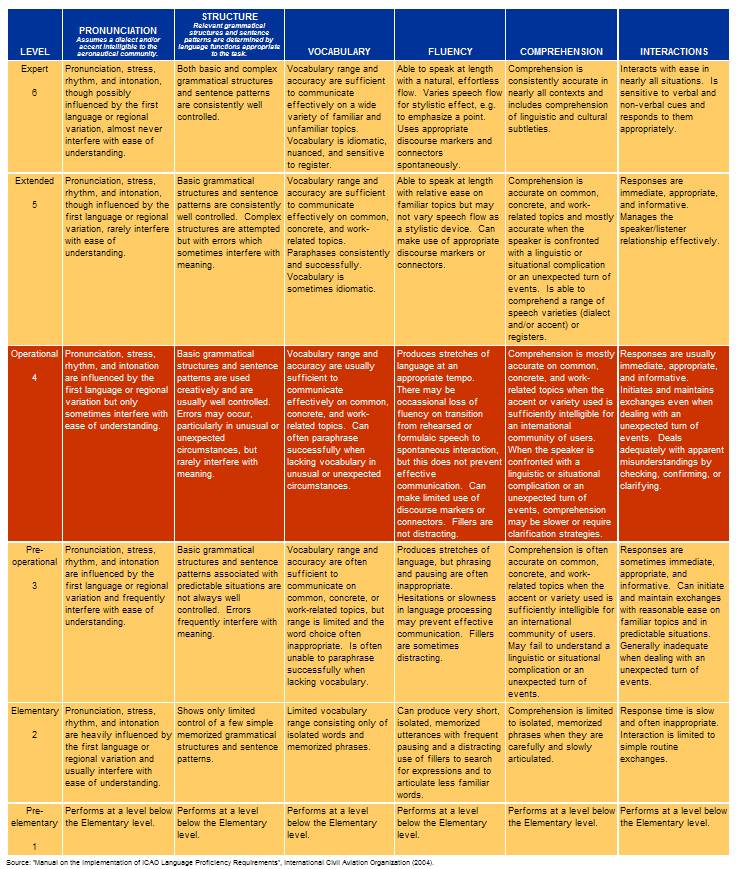How to study aviation English? ICAO Proficiency Scale
How to study aviation English
- Learn the aviation vocabulary. This includes both general aviation terms and specific terms for your area of specialization, such as piloting, air traffic control, or maintenance. You can learn aviation vocabulary from books, websites, and apps.
- Practice listening to and speaking aviation English. You can do this by listening to air traffic control recordings, watching aviation videos, and talking to other aviation professionals.
- Take an aviation English course. There are many aviation English courses available online and in person. These courses will teach you the specific language skills and knowledge you need to communicate effectively in an aviation environment.
ICAO language proficiency
The International Civil Aviation Organization (ICAO) has established six levels of English language proficiency for aviation professionals. These levels are:
- Level 1: Pre-elementary
- Level 2: Elementary
- Level 3: Intermediate
- Level 4: Operational
- Level 5: Extended Operational
- Level 6: Expert

To demonstrate compliance with ICAO language proficiency requirements, aviation professionals must pass an English language assessment. There are many different types of English language assessments available, but they all test the same four skills: listening, speaking, reading, and writing.
The minimum ICAO language proficiency requirement for aviation professionals is Level 4. However, some airlines and aviation organizations may require a higher level of proficiency.
Here are some tips for studying aviation English and preparing for an ICAO English language assessment:
- Immerse yourself in the English language as much as possible. This means surrounding yourself with English speakers and English-language media.
- Practice speaking and listening to aviation English as much as you can. You can do this by talking to other aviation professionals, watching aviation videos, and listening to air traffic control recordings.
- Take an aviation English course. This is a great way to learn the specific language skills and knowledge you need to communicate effectively in an aviation environment.
- Practice taking English language assessments. This will help you become familiar with the format of the assessment and the types of questions that are asked.
If you are serious about a career in aviation, it is important to develop a strong foundation in aviation English. By following the tips above, you can improve your English language skills and prepare for success in the aviation industry.
Aviation English Vocabulary Test 1
To access our tests, which include hundreds of preparation questions for Aviation English, go to the QUIZ/TEST tab on the site.
References:
- nternational Civil Aviation Organization (ICAO). (2011). Language proficiency requirements (Doc 9835, 5th ed.).
- Federal Aviation Administration (FAA). (2012). Language proficiency requirements for pilots, air traffic controllers, and other airmen (AC 60-16A, 10th ed.).
- Alderson, J. C. (2009). Air safety, language assessment policy, and policy implementation: The case of Aviation English. Annual Review of Applied Linguistics, 29, 168–187.
- Hülmbauer, C., Böhringer, H., & Seidlhofer, B. (2008). Introducing English as a lingua franca (ELF): Precursor and partner in intercultural communication. World Englishes, 27(1), 1–18.
- Takhmirt, Y. (2017). The use of English in civil aviation. Academia.edu.
- Aviation English Hub. (2023). List of references about Aviation English.



To whom it may concern;
I survey your web site and found it useful .
Many appreciate to put the aviation terms and benefit questions .